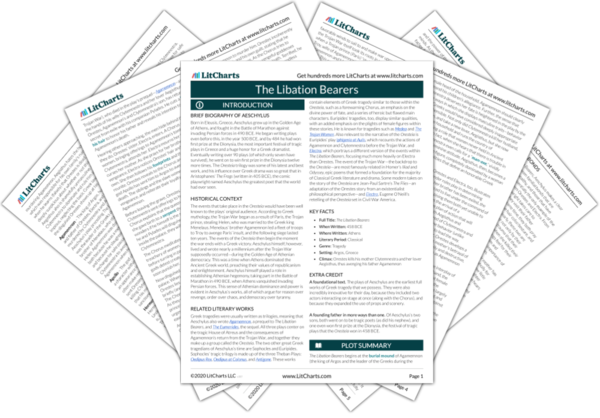Serpents and snakes are complex and double-edged symbols within The Libation Bearers. Early in the play, we learn that Clytemnestra has had a dream that she gave birth to a snake only to have it maul her. Orestes explains to us that the snake represents him, and that he will need to use deception and violence against his mother in order to avenge his father’s murder. Clytemnestra confirms this reading, realizing (moments from her death), that her dream foretold Orestes’ return. Later in the play, however, both Orestes and the Chorus refer to the treacherous Clytemnestra and Aegisthus as serpents, thus turning a symbol that was once seemingly positive into a negative one. Orestes’ connection with snakes and serpents, therefore, is more slippery than originally thought—he has taken on serpent-like qualities (such as deception, disguise, and betrayal) in order to carry out a divinely sanctioned act, but perhaps has also sinned gravely in the process.
Serpents and Snakes Quotes in The Libation Bearers
If the serpent came from the same place as I,
and slept in the bands that swaddled me, and its jaws
spread wide for the breast that nursed me into life
and clots stained the milk, mother’s milk,
and she cried in fear and agony—so be it.
As she bred this sign, this violent prodigy
so she dies by violence. I turn serpent,
I kill her. So the vision says.
But she who plotted this horror against her husband,
she carried his children, growing in her womb
and she—I loved her once
and now I loathe, I have to loathe—what is she?
Some moray eel, some viper born to rot her mate
with a single touch, no fang to strike him
just the wrong, the reckless fury in her heart!

















